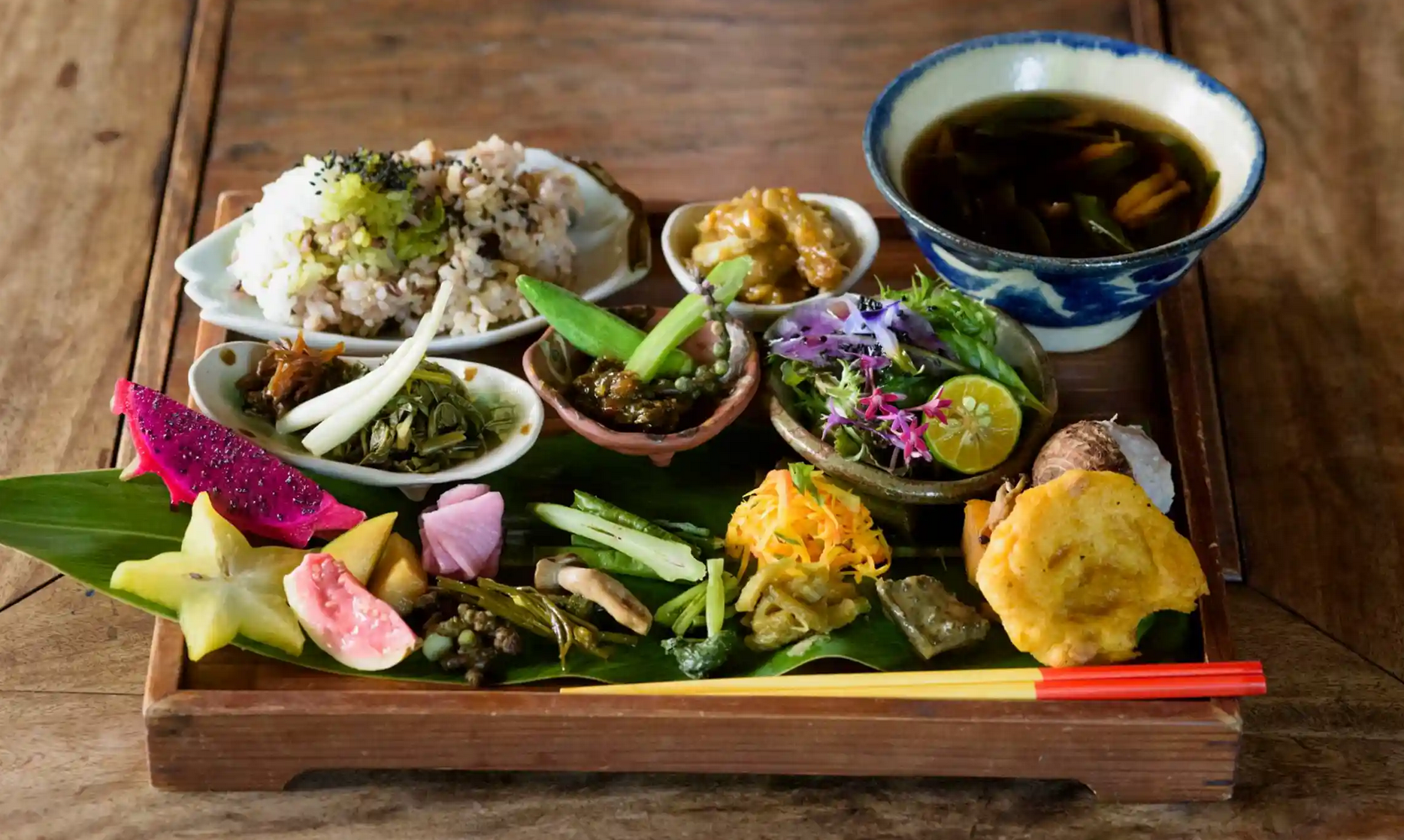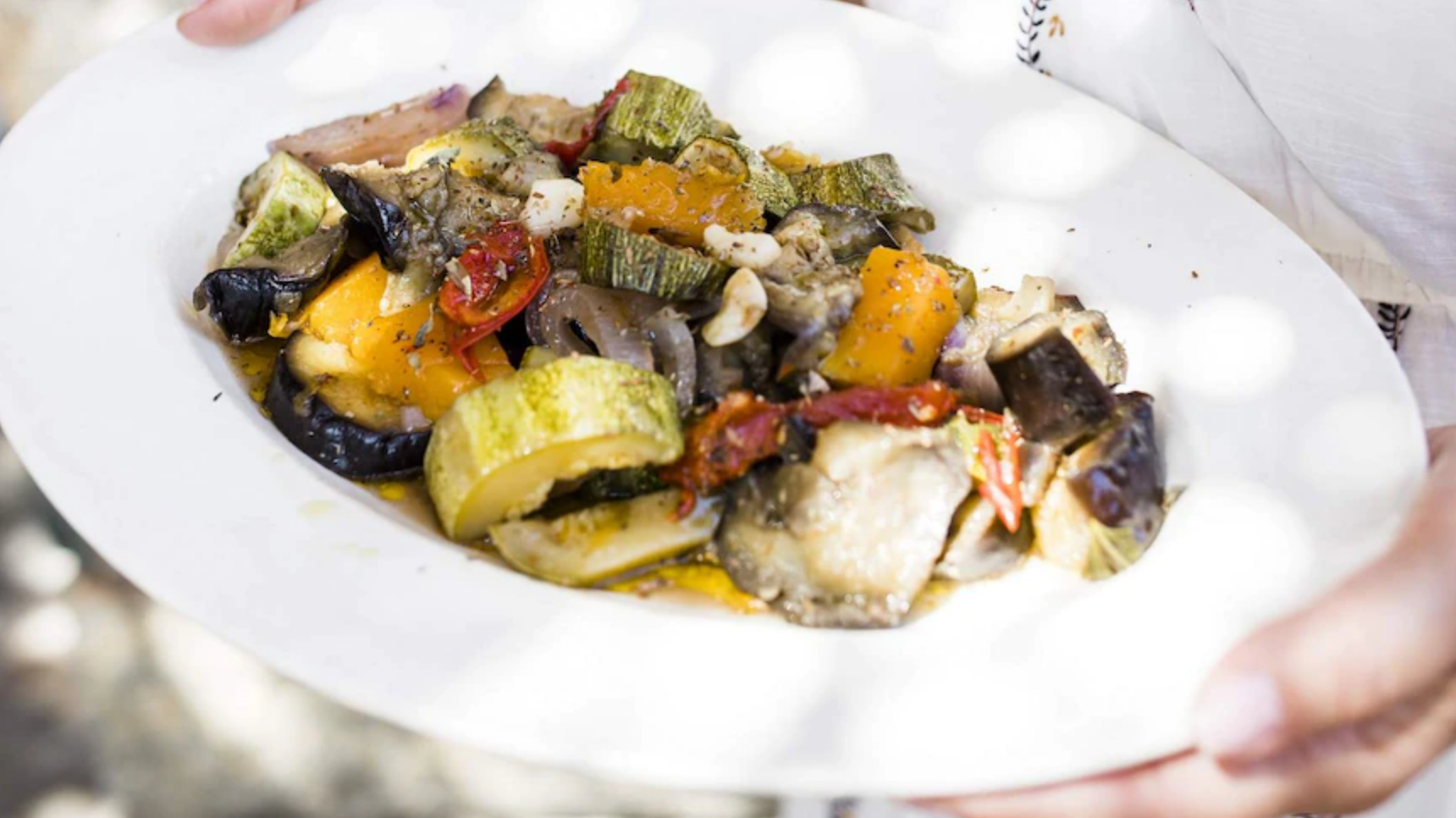People are continuously learning from those who live in blue zones, which are the five regions that are known to house the world’s healthiest people. A number of studies have found that these areas contain extremely high rates of nonagenarians and centenarians, which are people who live past the age of 90. People in blue zones have been studied in an attempt to discover practices that enhance longevity so that these practices can be implemented in other regions. While each blue zone is in a different part of the world, they all work together to show the link between diet and longevity, because they all eat a mostly whole foods, plant-based diet. The Blue Zones are Okinawa, Japan, Sardina, Italy, Ikaria, Greece, Loma Linda, California, and Nicoya, Costa Rica.

Life question; Does diet impact longevity? Graphic by Canva.
The image below shows commonly eaten food in Okinawa, Japan such as white sticky rice, miso soup, dark leafy greens, and cooked tofu. Vibrant orange and purple sweet potatoes, fresh seaweed, bitter melon, grassy okra, and earthy-sweet pumpkin fill 58-60% of residents’ plates. Another 30% of plate space is awarded to grains such as sticky white rice and soba noodles. Soy foods, such as tofu, miso, and edamame make up another 5%. Soy foods contain omega-3 fats, which are linked to a decreased risk of cardiovascular disease, the leading cause of death around the world. Whitefish, seafood, and pork are consumed on occasion. However, residents enjoy all cuts of meat, including organs, which are an excellent source of protein and Vitamin B12. In addition, alcohol, tea, and broth, also known as dashi, are regional favorites. Jasmine tea and antioxidant-rich spices, such as turmeric, are widely consumed. Residents of Okinawa never eat beef, poultry, bacon, ham, sausage, and other processed meats that are associated with type 2 diabetes, cardiovascular disease, and cancer. They also stay away from dairy which is linked to heart disease and breast cancer.

Detox lunch at Garamanjyaku, Okinawa, Japan. (Photo by Hirota Aotsuka)
Okinawa, Japan is home to more centenarians than anywhere else in the world. The longest living women in the world live here.
On the other hand, backyards in Sardina are full of organic onions, green beans, garlic, tomatoes, bright zucchini, and eggplant. Regular vegetable swaps with neighbors ensure a variety of colors and textures with every meal. Meat is not regularly available; approximately one cow is eaten by two families in the span of an entire season. Nevertheless, all of the meat that Sardinians consume is lean, free-range, organic, and full of omega-3 fatty acids. Fish consumption is limited to bottarga, which is a flattened fish that is commonly grated onto pasta dishes, and fresh sardines that are cooked into prominent cultural spices and red sauces. Unpasteurized cheese, such as pecorino cheese, is easier to consume than its pasteurized counterparts and is used in small amounts. Almost all foods in Sardinia are coated in rich olive oil by virtue of a plentiful supply of olive trees. Olive oil has been linked to increased bone density and T-cell production. T-cells the good immune cells that attack foreign invaders in the body.

An example of food in Sardinia. (Photography by Matt Russell).
Sardinia, Italy falls into the same, impressive category as Okinawa, housing the longest-living family among their many centenarian citizens.
In Ikaria, Greece, wild greens, cooked potatoes, lentils, and golden honey are commonly eaten. In addition, feta cheese, bright yellow lemons, sage, marjoram, and goat’s milk practically run in the veins of Ikaria’s citizens. Year-round gardens support a plant-heavy version of the traditional Mediterranean diet. These gardens produce a consistent flow of fresh fruits, vegetables, herbs, beans, and nuts — all of which support cognitive health. Horta is a popular wild leafy green that is best served raw with lemon or cooked in soups, salads, and savory pies. It is argued that Horta retains antioxidants better than most other foods when cooked. Horta-heavy diets can lower blood pressure, which in turn supports brain health.
In Ikaria, Greece, the people live for a long time, but they also have a dementia rate that is equal to about 10% of the rate that exists in the rest of the world.

An image of Soufico, one of Ikaria’s famous dishes. (Photo by Lean Timms and Hardie Grant)
The United States has the lowest life expectancy of almost every Western European Country. Among the world’s richest countries, the United States spends significantly more per capita on healthcare, despite ranking last in life span.
In the United States, citizens get about 50% of their daily calorie intake from foods like pizza, burgers, french fries, baked goods, and fizzy soda. Sugary drinks and sodas are the largest source of calories and added sugar in the American diet, with regular consumption leading to type 2 diabetes, obesity, heart disease, and decreased bone health. Less than 34% of the average Americans’ daily calories come from vegetables, whole grains, and fruits — the food groups that are best for cancer prevention. One in four Americans eats fast food every day, and the average fast food meal exceeds the safe daily level of sodium consumption. Fast food french fries are mostly cooked in corn oil, which is considered to be the worst oil for human health, as it is known to have an unusually high amount of saturated fat which contributes to heart disease.

An example of a typically American meal. (Photo by Michael Brauner)
The fast food industry in the United States is worth $278.6 billion. Fast food is linked to a higher risk of depression, cancer, digestive issues, and early death. In addition, around 80% of Americans get their protein primarily from processed meat, which has strong links to cardiovascular disease and type 2 diabetes. The World Health Organization classified processed meats as a group 1 carcinogen, a category it shares with tobacco.
To effectively eat for longevity, one should find the foods that they enjoy from the world’s blue zones and learn to incorporate them into their diet. Eating real, organic, whole foods undoubtedly contributes to longevity.
This piece was edited by Eliza Griggs as part of Professor Kelley Crawford’s Digital Civic Engagement course at Tulane University.
 NOLAbeings
Multimedia artist Claire Bangser created NOLAbeings as a portrait-based story project that marries...
NOLAbeings
Multimedia artist Claire Bangser created NOLAbeings as a portrait-based story project that marries...
 Data corner: Adobe Suite (create a PDF, social media graphic, presentation, edit a photo and video
Data corner is where you go to work with analytics and top tech skills. It takes on everything from PERL and SQL to Canva and Sprout Social.
Data corner: Adobe Suite (create a PDF, social media graphic, presentation, edit a photo and video
Data corner is where you go to work with analytics and top tech skills. It takes on everything from PERL and SQL to Canva and Sprout Social.
